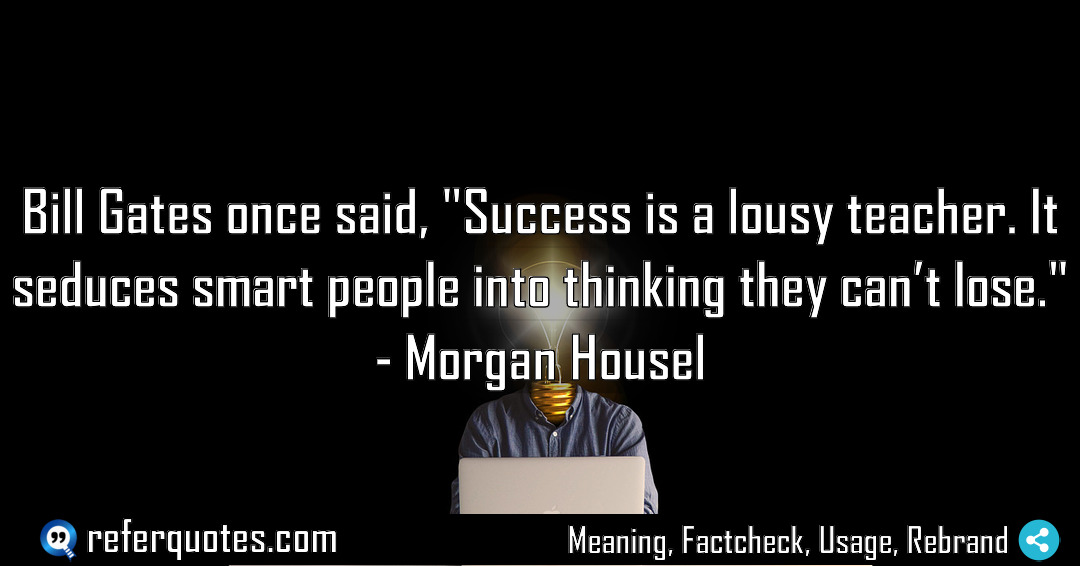
Bill Gates once said, “Success is a lousy teacher…” and honestly, he nailed a dangerous truth we see all the time. It’s the reason so many brilliant people and companies eventually stumble. They get seduced by their own success story, forgetting that luck and a specific set of circumstances often played a huge role.
Share Image Quote:
Table of Contents
Meaning
The core message is that winning can make you overconfident and blind to the role of chance, setting you up for a much harder fall later.
Explanation
Let me break this down. When you succeed, especially if you do it quickly, your brain creates this beautiful, simple narrative: “I did A, which led to B, and that’s why I won.” The problem is, that narrative almost always leaves out the hidden variables—the lucky break, the market timing, the competitor’s mistake. You start to believe your process is infallible. And that’s the seduction. It feels so good to be right that you stop questioning your methods. You stop building in margins of safety. You become rigid. And the world, of course, is anything but rigid. It’s fluid, chaotic, and loves to humble the overconfident.
Quote Summary
Reading Level55
Aesthetic Score60
Origin & Factcheck
This is a quote from Bill Gates, but it was famously popularized by Morgan Housel in his 2020 book, The Psychology of Money. It’s often misattributed to Housel himself, but he’s very clear that he’s quoting Gates to illustrate a key principle in behavioral finance.
Attribution Summary
Where is this quotation located?
| Quotation | Bill Gates once said, "Success is a lousy teacher. It seduces smart people into thinking they can’t lose." |
| Book Details | Publication Year: 2020; ISBN-10: 0857197681; ISBN-13: 978-0857197689; Pages: 256 (approx.) |
| Where is it? | Unknown chapter / page |
Context
In the book, Housel uses this quote to anchor a chapter on risk and hubris. He’s talking about how in finance and business, we consistently underestimate the role of luck and overestimate our own skill. The quote perfectly encapsulates why the most dangerous moment for any investor or entrepreneur is often right after a big win.
Usage Examples
You see this everywhere once you start looking. Think about the tech founder whose first startup gets acquired for a fortune. They launch a second one with the exact same playbook, convinced they’ve cracked the code, only to flame out because the landscape had changed. Or the investor who makes a killer stock pick based on a gut feeling, doubles down on that “strategy,” and then loses it all on the next trade. I use this concept constantly when mentoring new team leads. I tell them, “Don’t let a few successful projects go to your head. The real skill isn’t in the win; it’s in understanding *why* you won, and being humble enough to know that the ‘why’ might not be repeatable.”
To whom it appeals?
Share This Quote Image & Motivate
Motivation Score60
Popularity Score65
Shareability Score70
FAQ
Question: So, is success always bad?
Answer: Not at all! It’s a fantastic reward. The danger isn’t success itself, but the narrative we build around it. The key is to treat success with skepticism and to study your failures more intently than your wins.
Question: Who should keep this quote in mind?
Answer: Honestly, everyone, but especially leaders, investors, entrepreneurs, and anyone in a creative field. Anyone whose work involves uncertainty and risk.
Question: How do you avoid this trap?
Answer: By actively practicing intellectual humility. Conduct pre-mortems on your decisions. Actively seek out disconfirming evidence. And most importantly, separate the outcome from the process. A good decision can lead to a bad outcome, and vice-versa.
Similar Quotes
You know, “There’s no secret to success—just smart work” perfectly captures what I’ve seen work for years. It’s not about finding a magic bullet. It’s about doing the right things…
You know, the most powerful teaching moments often come from our mistakes. It’s a game-changer for how we lead and parent. Table of Contents Meaning Explanation Origin & Factcheck Context…
You know, “The most successful people are the ones…” isn’t just a nice saying. It’s the operating system for real growth. Table of Contents Meaning Explanation Origin & Factcheck Context…
Success comes to those who become success conscious is a powerful idea. It’s not about luck, but about actively programming your mind to spot and seize opportunities. Let’s break down…
You know, I’ve seen it time and again: The more you help others, the more successful you become. It’s not just a nice idea; it’s a fundamental law of business…
